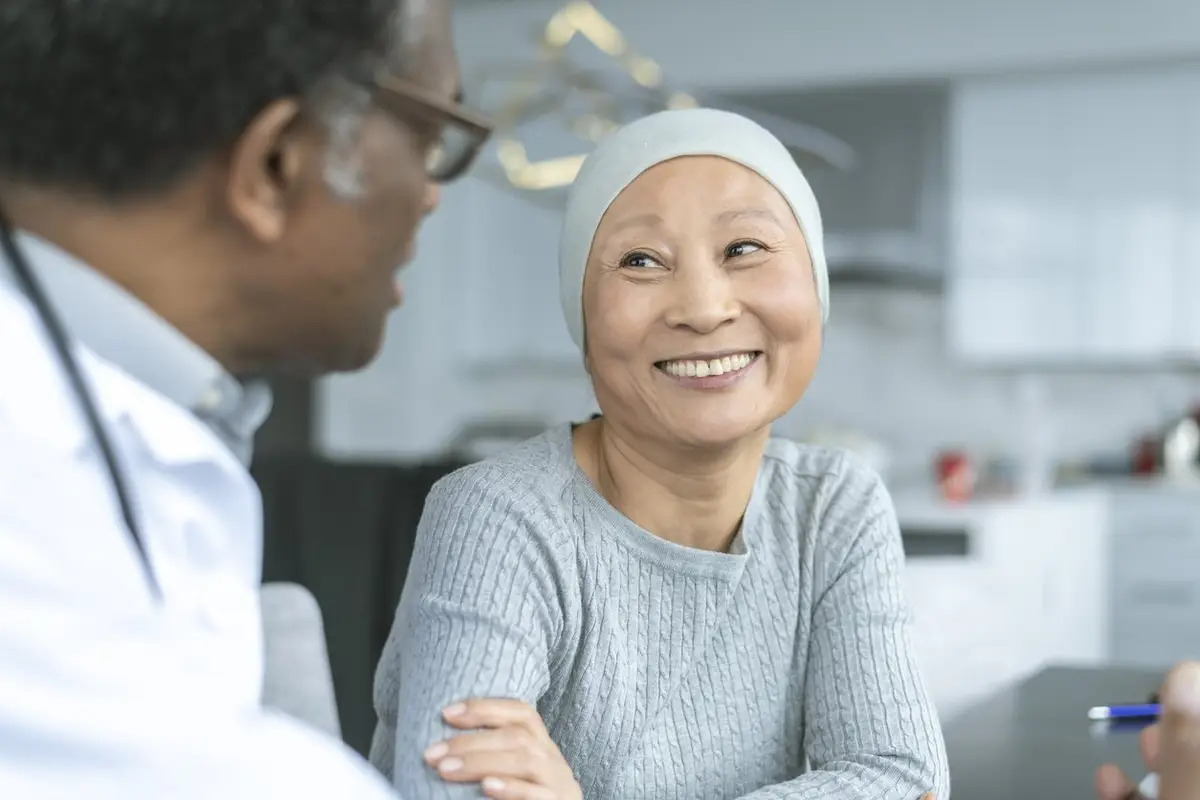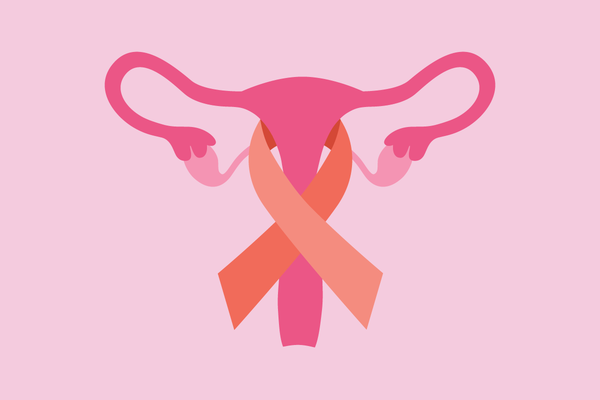It was 2017, and Jurline Redeaux was having a good year. She was 65 years old and thriving, enjoying her work as a social worker for Los Angeles County and the financial stability it gave her.
Then one day Redeaux noticed what looked like period blood and, because she is postmenopausal, decided to get the bleeding checked out right away. Soon after, she was diagnosed with endometrial cancer, which is cancer that starts in the lining of the uterus. It’s the most common gynecologic cancer, affecting 50,000 women in the United States every year.
“I had finally gotten my life together,” Redeaux said. “The cancer diagnosis blew me away.”
Watch: How Endometrial Cancer Is Diagnosed
Understanding the ways endometrial cancer can impact daily life may help newly diagnosed women prepare for what comes next.
Treating endometrial cancer
Treatment for endometrial cancer depends on the stage — how advanced the cancer is and whether it has spread to other parts of the body.
Surgery is often the main treatment for most women with endometrial cancer. The surgery both removes cancer and allows providers to see what stage it is.
“The vast, vast majority of women with endometrial cancer will be cured by surgery,” said Blair C. McNamara, M.D., a board-eligible obstetrician gynecologist and clinical fellow in gynecologic oncology at Yale University School of Medicine. She added that the surgery is usually done with small incisions, meaning it is minimally invasive.
“That recovery is anywhere from two weeks to a month, and then they’ll meet with the surgeon to discuss what the final pathology showed — how advanced the cancer is — and form a plan from there,” McNamara said. Patients usually need to avoid strenuous exercise and sex during recovery from surgery.
Although endometrial cancer is often diagnosed in postmenopausal women, younger women may also have the disease. Women who are diagnosed at a younger age often have early-stage, low-grade disease and may be able to consider treatments that help save their fertility, such as oral progestin or IUDs.
Depending on the stage, endometrial cancer treatment may also include:
- Radiation: the use of high-energy radiation to kill cancer cells
- Chemotherapy: the use of drugs to kill cancer cells
- Hormone therapy: the use of hormones (such as progestin) or hormone-blocking drugs to treat cancer
- Targeted drug therapy: the use of drugs that target certain changes in cancer cells
- Immunotherapy: the use of drugs that help your immune system recognize and kill cancer cells
- Palliative care: the use of a variety of treatments and therapies to slow the cancer’s spread while managing pain and other symptoms
Side effects of endometrial cancer treatment
The side effects and impact on day-to-day routine will be different for each type of treatment.
“For people who get radiation treatment, there can be some vaginal symptoms that start immediately and can persist for years,” McNamara said. These can include dryness, irritation and a narrowing of the vagina. They can often be managed with vaginal moisturizers, oncologist-approved estrogen creams and vaginal dilators.
Read: Good Sex with Emily Jamea: Sex After Cancer >>
Women who are receiving chemotherapy or immunotherapy may be too tired to do their everyday activities, or they may feel too sick to eat normally and will need to change their eating habits.
Talking with a healthcare provider (HCP) about your specific treatment plan can help you know what to expect in terms of side effects and what activities you can and can’t do during treatment.
Read: Clinically Speaking: Questions to Ask Your HCP About Endometrial Cancer >>
Seeking support for mental health
Redeaux also suggests women insist on being assigned a medical social worker or other advocate who can connect them with helpful resources, such as a dietitian to help manage nutrition during chemo.
McNamara urges people living with endometrial cancer to be open about their mental health issues. “One of the best ways to support mental health is talking about their worries and concerns with their provider team, and with their families and friends,” she said. “We also often recommend that our patients start seeing a therapist if they're not already.”
For Redeaux, who was already dealing with depression and anxiety, her diagnosis caused a spike in her symptoms. But she recognized what was happening and immediately sought treatment. She urges others to do the same.
“A lot of women with cancer I talk to feel shame about being depressed,” Redeaux said. “You’ve just been told you might die — are you supposed to jump up and be happy?”
Dealing with the possibility of cancer coming back
Almost 1 out of 5 women with endometrial cancer will experience recurrence, meaning the cancer comes back after successful treatment. Being aware of this possibility — and knowing what to watch for — can help you and your provider catch the recurrence early.
Symptoms of endometrial cancer recurrence include:
- Vaginal or rectal bleeding
- Unexplained weight loss
- Pain in your pelvis, back, belly or hips
- Shortness of breath
- Swelling in your belly or legs
If you’ve had endometrial cancer and notice these symptoms (or anything else that seems off), talk to your HCP right away. How a recurrence is treated will depend on where it is, as well as what kind of treatments you’ve had in the past.
Another cause for concern: second cancers after endometrial cancer. A second cancer is a new, unrelated cancer that occurs later. Endometrial cancer survivors can develop any type of second cancer, but their risk is increased for certain types. These include breast, colon, rectal, lung and bladder cancers and more. Colon and breast cancers are the most common.
Read: I Was on High Alert for Cancer, but not Endometrial Cancer >>
McNamara said that it’s normal and understandable to worry about cancer coming back, but women should ask for help if their anxiety is preventing them from living a full and happy life.
“If someone is finding themselves completely consumed and obsessed with fear about a recurrence, that’s a time when you should definitely ask your oncologist for help,” McNamara said. A patient’s provider may be able to provide some much-needed perspective. “Like I said, a vast majority of patients will be cured with surgery — which means we do not expect the cancer to come back.”
Living well with endometrial cancer
Redeaux believes education is key to coping after an endometrial cancer diagnosis. “Learn as much as you can prior to even meeting with your doctor,” she said.
She also suggests women reach out to organizations such as the Endometrial Cancer Action Network for African Americans (ECANA) and SHARE Cancer Support for information and guidance.
“You don’t have to go through this alone,” Redeaux said.
McNamara advises women living with endometrial cancer to keep doing what makes them happy, through treatment and beyond.
“Whether it’s exercise, walking, going outside in nature, spending time with your children or your dog, gardening. … Whatever activities bring patients comfort and joy should definitely continue.”
Resources
Endometrial Cancer Action Network for African Americans (ECANA)
This resource was created with support from Merck.
- Let’s Talk About Endometrial Cancer ›
- My Endometrial Cancer Was Dismissed as Fibroids ›
- Clinically Speaking: Questions to Ask Your HCP About Endometrial Cancer ›
- Postmenopausal Women and Endometrial Cancer ›
- Fast Facts: What You Need to Know About Endometrial Cancer ›





